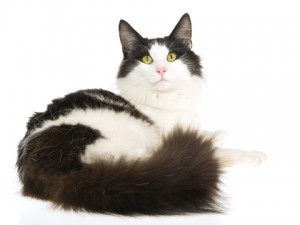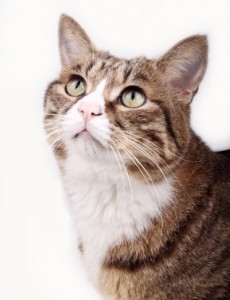My cat is peeing outside of the litter box. How do I get him to use it?
Q: “Please I need help! My 18 week old kitten is peeing outside of his box. I am using the pine pellet litter, same as he had in the shelter and he has been fine for 6 weeks. This week he peed in a cat bed that had some papers lying in it and early this morning he peed in my bed. Right up by my face. My last cat had litter box problems and cost me a house full of new carpet. I can’t afford to have this problem again. Please share any advice you might have. Thank you!” – Jill
A: Make sure to have your kitty checked by your veterinarian to rule out any medical issues, such as a urinary infection. Cats prefer sandy fine clay litters, clumping (to remove urine), and unscented. They also prefer to urinate and defecate in different areas or boxes, unless boxes are immaculate. Large shallow sweater boxes (6″ high) make the best cat pans. Most boxes are too small for cats and/or they are too dirty, too deep, and/or flush to a wall, making the litter box access and area even smaller. The smaller the box, the dirtier it gets.
Pine pellets are not a preferred substrate for cats. In addition, urine stays in the litter and makes the box rather smelly, especially for the cat. The pine scent simply masks the odor temporarily for people. Boxes should be washed with hot soap and water every two weeks or the urine smell can get into the plastic. Avoid keeping litter pans in the basement. Cats also tend to like a peripheral/landscape view of an area where they can see all entries and exits. Basements tend to be too far away for cats when they want to use the litter box, and often litter pans in basements stay dirtier because they are not cleaned regularly. A litter box for one cat should be cleaned a minimum of three times per day. Ideally, more often, every time after s/he uses it. Please read How to Resolve a Litter Box Problem.
How do I get my cat to use his litter box?
Q: “My kitty is approx. 2.5 years old (was a rescue so I don’t know)? His name is Dexter and he won’t stop peeing all over the house, especially on carpeted surfaces. I clean or change his boxes everyday and have tried just about everything. (i.e., hormone collars, new litter everyday, training, visiting the vet multiple times…). I don’t know what to do with him and he just recently went number two outside of his boxes as well. I love him so much, but it’s difficult to live with this problem. He was feral before I adopted him off the streets of Baltimore but easily adapted to home living. It wasn’t a problem until earlier this year. Please if there is anything that I could do to help him, I am willing to try just about anything at this point. Thank you.”
A: If it is a relatively new issue and Dexter was using the box, it is more likely a problem with your litter box arrangement. Cats like to see all entries and exits or a peripheral view of an area. This is important for litter box placement, as well as locations for food and water bowls. Large shallow (6” in height) sweater boxes are the best litter pans. Clumping unscented litter is a must. Cleanliness is also important. Many cats like to urinate and defecate in separate locations. Often litter boxes are too close together or flush against a wall. This makes the area the cat has access to much smaller. Using an appropriate enzymatic cleaner to thoroughly get rid of odors is important. If Dexter is going near the boxes, but not in them, he more than likely thinks the box is too small or too dirty. Covered boxes and deep boxes (tubs) should be avoided. Always be sure to get your kitty checked by the veterinarian to rule out underlying medical issues, such as a urinary tract infection. See How to Resolve a Litter Box Problem.
Copyright © Alana Stevenson 2012
Alana Stevenson can be contacted through her website AlanaStevenson.com. She provides consultations by phone and Skype.

